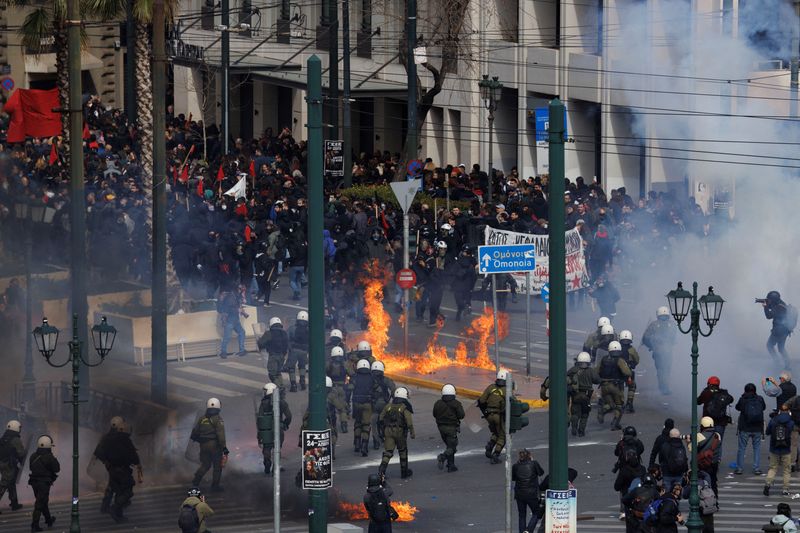By Stelios Misinas and Stamos Prousalis
ATHENS (Reuters) -Thousands of Greek workers walked off the job on Thursday and rallied in central Athens in protest at neglected safety standards they say led to the deadliest train crash in the country's history.
Flights to and from Greece were grounded, ships remained docked at ports, and public services and state schools were closed as workers joined the 24-hour strike called by Greece's largest labour unions, GSEE and ADEDY.
The walkout is the latest in a series of protests since the head-on collision last month of a passenger train carrying more than 350 people, most of them university students, with a freight train near the city of Larissa in the central Greek region of Tempi. The crash killed 57.
Protesters accuse the conservative government and the country's political system of ignoring repeated calls by unions over deficient safety measures.
"It was not human error, it was crime," read a banner held by protesters rallying outside parliament in Athens. "Our dead, your profits," read another one.
Clashes broke out when a group of protesters broke off the rally and hurled petrol bombs at police officers who responded with teargas.
More than 25,000 people rallied in central Athens, according to police estimates, and protests were also held in other Greek cities.
Last week, tens of thousands rallied in the capital and other cities in the largest street demonstrations the government has faced since being elected in 2019.
DELAY, APOLOGY AND PROMISES TO FIX
The train crash has stirred public outrage against consecutive governments over the last decade that have delayed a plan to install safety systems across the country's 2,500-km (1,550-mile) rail network.
Prime Minister Kyriakos Mitsotakis, whose term ends in July, has apologised over the crash, promised to hire more staff and to fix the rail sector with support from the European Union.
The government has also acknowledged under-investment and neglect - a legacy of Greece's decade-long debt crisis - and ordered a judicial inquiry, but it has blamed the crash mainly on human error.
Four railway workers have been detained and accused of disrupting public transport leading to deaths.
Rail workers have staged rolling strikes, and demanded the government revamps the sector.
"We will not allow a lack of transparency, a cover-up, a renunciation of responsibilities and any delays to lead to oblivion," private sector union GSEE said in a statement.
Passenger and freight services, halted since March 1 for safety checks, are expected to resume gradually from next week.
Urban transport was also disrupted on Thursday as metro staff held work stoppages and taxi drivers joined the walkout.
Meanwhile, people laid flowers and candles at the Athens central train station, and carried placards bearing the slogans of the protests.

"Message me when you get there," read one carried by a student marching to parliament.
"Measures should have been taken a long time ago and (they should not be) waiting for an accident to happen to take them," 33-year old taxi driver Theodoros Dokos said. "Whatever the measures are, they do not appease the pain of the people."
